Social media has become a powerful platform for businesses to connect with their audience, and analyzing social media data is crucial for effective marketing strategies. These tools offer insights and metrics that enable marketers to measure the performance of their social media campaigns, track audience engagement, and make data-driven decisions to optimize their marketing efforts.
Mentioned below are some of important statistics that emphasize the importance of using social media analytics tools:
- According to a survey by Social Media Examiner, 89% of marketers use social media as a tool to increase brand exposure.
- The same survey revealed that 73% of marketers believe that social media marketing has been somewhat effective or very effective for their businesses.
- A study by Sprout Social found that 57% of consumers are more likely to buy from brands they follow on social media.
- According to Statista, the global social media analytics market is projected to reach a value of $14.96 billion by 2027.
This article aims to provide comprehensive information about the top social media analytics tools available to marketers.

Top 9 Social Media Analytics Tools
Social media analytics tools play a crucial role in helping marketers analyze and measure the performance of their social media efforts. Here are the top 9 tools marketers should consider using.
Arena Calibrate
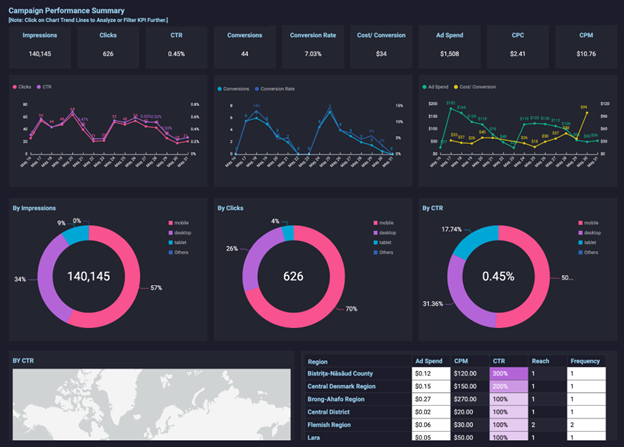
Arena Calibrate provides comprehensive insights and analytics for effective social media management.
Features:
- Offers real-time data and analytics on social media performance, engagement metrics, and audience behavior.
- Provides customizable dashboards to track and visualize key metrics, allowing marketers to monitor performance at a glance.
- Enables users to compare their social media performance against competitors and industry benchmarks.
- Provides sentiment analysis to gauge the overall sentiment and perception of the brand on social media platforms.
Pros:
- Provides up-to-date data and analytics to track social media performance in real-time.
- Allows users to customize dashboards based on their specific metrics and reporting needs.
- Offers valuable insights into competitor performance and industry benchmarks.
- Provides a deeper understanding of the brand's perception and sentiment on social media.
Cons:
- May have a high cost associated with accessing the full range of features and capabilities.
- Users may require some time to familiarize themselves with the tool's interface and features.
Sprout Social

Sprout Social is a popular social media management tool that offers a suite of features for scheduling and publishing content, monitoring social media conversations, and analyzing performance. It provides businesses with valuable insights and reporting to optimize their social media strategies.
Features:
- Unified social media management platform
- Social media scheduling and publishing
- Advanced analytics and reporting
- Social listening and keyword monitoring
- Customer relationship management (CRM) integration
Pros:
- User-friendly interface
- Robust analytics and reporting capabilities
- Excellent customer support
- Integrated social media management features
Cons:
- Higher pricing for advanced features
- Limited features for small businesses
Hubspot

HubSpot is an all-in-one marketing platform that includes social media management capabilities.
It offers features for scheduling and publishing content, monitoring conversations, and analyzing social media performance. HubSpot integrates with other marketing tools to provide a comprehensive solution for businesses.
Features:
- Social media scheduling and publishing
- Content planning and calendar
- Social media monitoring and listening
- Analytics and reporting
- Integration with HubSpot CRM and marketing tools
Pros:
- Comprehensive social media management features
- Integrated with HubSpot's marketing and CRM ecosystem
- User-friendly interface
- Excellent customer support
Cons:
- Pricing may be higher for smaller businesses
- Advanced features may require additional subscriptions
BuzzSumo
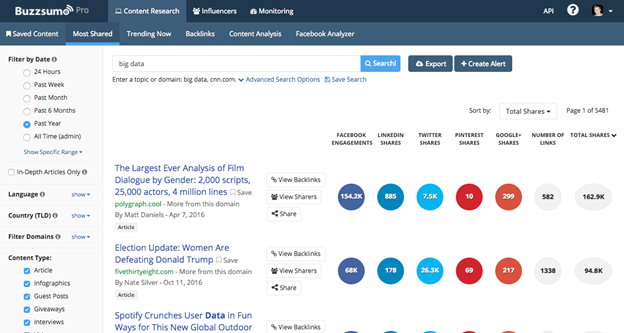
BuzzSumo is a content discovery and social media analytics tool. It helps businesses find trending content, identify key influencers, and analyze content performance on various social media platforms. BuzzSumo provides insights that can inform content strategies and improve social media engagement.
Features:
- Content discovery and analysis
- Social media monitoring and listening
- Influencer identification and tracking
- Competitor analysis
- Trend analysis and topic tracking
Pros:
- Robust content discovery capabilities
- Influencer identification and tracking
- Competitive analysis features
- Insightful trend analysis
Cons:
- Limited social media scheduling features
- Pricing may be higher for advanced features
Buffer

Buffer is a social media management tool that focuses on content scheduling and publishing. It offers features for planning and organizing content calendars, scheduling posts, and analyzing post performance. Buffer is known for its user-friendly interface and affordability.
Features:
- Social media scheduling and publishing
- Content planning and calendar
- Social media analytics and reporting
- Team collaboration and approval workflows
- Integration with third-party apps
Pros:
- User-friendly interface
- Advanced scheduling and publishing features
- Good analytics and reporting capabilities
- Affordable pricing options
Cons:
- Limited social listening and monitoring features
- Advanced features available only in higher-priced plans
Hootsuite
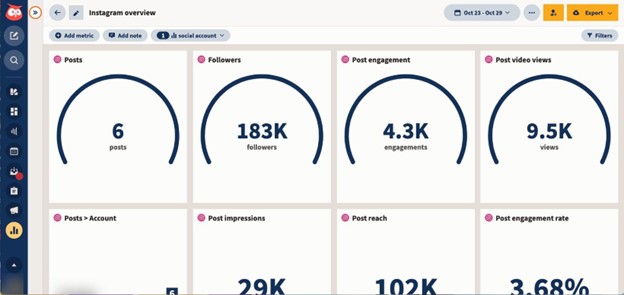
Hootsuite is a widely used social media management platform that allows businesses to schedule and publish content, monitor social media conversations, and analyze performance across multiple platforms. It offers a range of features for team collaboration and integration with other tools.
Features:
- Social media scheduling and publishing
- Social listening and monitoring
- Team collaboration and approval workflows
- Analytics and reporting
- Integration with third-party apps
Pros:
- Wide range of social media management features
- Robust social listening capabilities
- Team collaboration features
- Extensive integration options
Cons:
- Learning curve for new users
- Higher pricing for advanced features
Zoho Social
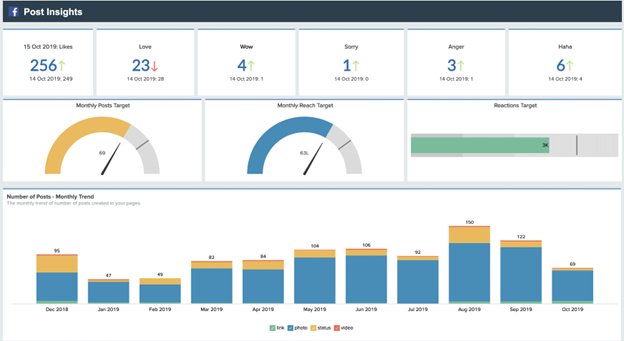
Zoho Social is a social media management tool that provides features for content scheduling and publishing, social media listening, and analytics. It offers integration with other Zoho business tools and provides affordable pricing plans for businesses of all sizes.
Features:
- Social media scheduling and publishing
- Content planning and calendar
- Social media listening and monitoring
- Analytics and reporting
- Team collaboration and approval workflows
Pros:
- User-friendly interface
- Affordable pricing plans
- Social media listening and monitoring features
- Integration with Zoho's suite of business tools
Cons:
- Advanced features may be limited compared to some competitors
- Reporting options may be basic for some users
Rival IQ
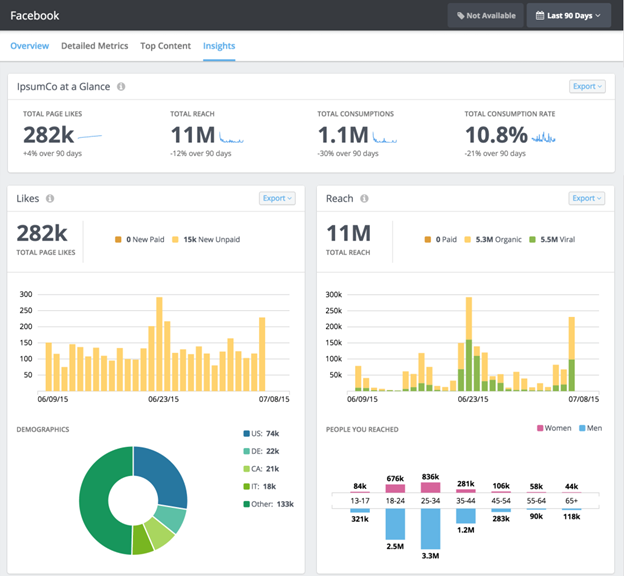
Rival IQ is a competitive analysis tool that focuses on social media analytics. It helps businesses benchmark their social media performance against competitors, analyze trends, and track content performance. Rival IQ offers customizable dashboards and reporting for in-depth insights.
Features:
- Social media analytics and reporting
- Competitor benchmarking and analysis
- Social media listening and monitoring
- Trend analysis and content performance tracking
- Customizable dashboards and reporting
Pros:
- Robust competitor analysis and benchmarking features
- In-depth social media analytics and reporting
- Customizable dashboards for tracking key metrics
- Comprehensive social media listening capabilities
Cons:
- Pricing may be higher for advanced features
- Learning curve for new users
Iconosquare
Iconosquare is a social media analytics and management tool specifically designed for Instagram and Facebook. It provides features for scheduling and publishing content, analyzing performance metrics, and competitor benchmarking. Iconosquare offers insights to optimize Instagram and Facebook strategies.
Features:
- Instagram and Facebook analytics
- Content scheduling and publishing
- Competitor analysis and benchmarking
- Social media listening and sentiment analysis
- Customizable analytics and reporting
Pros:
- Comprehensive Instagram and Facebook analytics
- Competitor benchmarking and analysis
- Social media listening and sentiment analysis features
- Customizable reporting options
Cons:
- Limited support for other social media platforms
- Pricing may be higher for advanced features
Benefits of Using Social Media Analytics Software
Using social media analytics software offers several benefits for businesses looking to optimize their social media strategies and achieve meaningful results. Here are some key advantages:
Understand Your Audience Better
Social media analytics software provides insights into your audience demographics, preferences, and behaviors. By analyzing data on engagement, reach, and sentiment, you can gain a deeper understanding of your target audience, allowing you to tailor your content and messaging to resonate with them effectively.
Analyze Competitors
Social media analytics software allows you to monitor and analyze your competitors' social media performance. By tracking their strategies, content, and audience engagement, you can identify opportunities and areas for improvement in your own campaigns.
This competitive analysis enables you to stay ahead in the market and make informed decisions based on industry benchmarks.
Plan a Strategy that Works
With social media analytics software, you can evaluate the performance of your past campaigns and identify what works and what doesn't. By analyzing data on engagement, conversions, and other metrics, you can refine your strategy, optimize your content, and allocate resources more effectively to achieve your marketing goals.
Analyze Social Media Campaigns
Social media analytics software allows you to measure the effectiveness of your social media campaigns in real-time. By tracking metrics such as impressions, click-through rates, and conversions, you can identify which campaigns are driving the desired results and make data-driven decisions to improve future campaigns.
Create Better Content
Social media analytics software provides insights into the performance of your content. By analyzing metrics such as engagement rates, shares, and comments, you can understand what type of content resonates with your audience. This information helps you create more compelling and relevant content that drives engagement and builds brand loyalty.
Data-driven Decision-Making
Social media analytics software enables you to make data-driven decisions based on accurate and real-time insights. By analyzing metrics and trends, you can identify patterns, uncover opportunities, and adjust your strategies to align with your business objectives. This approach reduces guesswork and enhances the effectiveness of your social media efforts.
Performance Tracking
Social media analytics software allows you to track the performance of your social media accounts and campaigns in one centralized platform. It provides a comprehensive view of key metrics, such as follower growth, engagement rates, and impressions, enabling you to monitor progress and track the impact of your social media activities over time.
ROI Measurement
Social media analytics software enables you to measure the return on investment (ROI) of your social media efforts. By tracking metrics such as conversions, revenue generated, and cost per acquisition, you can determine the effectiveness and profitability of your social media campaigns, helping you allocate resources strategically.
Content Optimization
Social media analytics software helps you optimize your content by providing insights into what type of content performs best on different platforms. By analyzing data on engagement, reach, and conversions, you can refine your content strategy, focus on high-performing content formats, and deliver more relevant and valuable content to your audience.
Influencer Identification
Social media analytics software can assist in identifying influencers relevant to your industry or niche. By analyzing data on follower count, engagement rates, and audience demographics, you can identify potential influencers for partnerships and collaborations, enhancing your brand's reach and credibility.
Crisis Management
Social media analytics software can be invaluable in managing crises or reputation issues. By monitoring conversations, sentiment analysis, and brand mentions, you can quickly identify and address negative sentiment or emerging issues, allowing you to respond promptly and effectively to protect your brand's reputation.
Key Factors to Consider in Selecting Social Media Analytics Tools
Selecting the right social media analytics tool is crucial for effectively measuring and optimizing your social media efforts. Here are key factors to consider:
Features and Functionality
Assess the features and functionality offered by the analytics tool. Look for capabilities such as data tracking, social listening, sentiment analysis, competitor analysis, content scheduling, and customizable reporting. Choose a tool that aligns with your specific analytics needs and business goals.
Platform Coverage
Ensure that the tool supports the social media platforms you use for your marketing activities. It should provide comprehensive coverage across major platforms such as Facebook, Twitter, Instagram, LinkedIn, and YouTube. Consider whether it also covers emerging platforms relevant to your industry.
Data Accuracy and Reliability
Verify the accuracy and reliability of the data provided by the tool. Look for data validation processes, data sources, and user reviews to ensure the tool delivers accurate insights. Reliable data is essential for making informed decisions and measuring the impact of your social media campaigns.
User-Friendliness
Consider the user-friendliness of the tool's interface and ease of navigation. It should offer an intuitive and user-friendly experience, allowing you to access and analyze data without unnecessary complexity. A user-friendly tool saves time and enhances productivity.
Pricing and Scalability
Evaluate the pricing structure and scalability of the tool. Determine whether it aligns with your budget and future growth plans. Consider whether the tool offers different pricing tiers or custom plans based on your specific needs. Scalability is essential to accommodate your business's expanding social media presence.
Customer Support and Training
Assess the level of customer support and training offered by the tool provider. Look for resources such as documentation, tutorials, webinars, and responsive customer support channels. Strong support and training options ensure you can maximize the tool's capabilities and address any technical issues or inquiries.
How to Track Social Media Analytics?
Tracking social media analytics is essential for understanding the performance and impact of your social media efforts. Here are steps to effectively track social media analytics:
Choose the Right Social Media Platform
Identify the social media platforms that are most relevant to your business and target audience. Focus your tracking efforts on platforms where your target audience is most active and engaged. Each platform may have different metrics and analytics tools available, so select the platforms that align with your goals.
Choose the Right Metrics
Determine the key metrics that align with your social media goals. Metrics may include engagement metrics (likes, comments, shares), reach and impressions, click-through rates, conversions, follower growth, and sentiment analysis. Select metrics that provide insights into your desired outcomes and align with your overall marketing objectives.
Define the Time Frame
Set a specific time frame for tracking your social media analytics. This could be weekly, monthly, quarterly, or based on specific campaigns or events. Having a defined time frame allows you to track progress, identify trends, and measure the impact of your efforts accurately.
Set up Tracking Tools
Utilize social media analytics tools that provide robust tracking capabilities. These tools can track and analyze data from multiple platforms, consolidate metrics, and provide visualizations and reports. Popular tools include Sprout Social, Hootsuite, Google Analytics, and native platform analytics.
Analyze Audience Demographics
Dive into the demographic data available through your tracking tools. Analyzing audience demographics such as age, gender, location, and interests can help you better understand your target audience and tailor your content and messaging accordingly.
Compare Against Benchmarks
Benchmark your social media performance against industry standards or competitors. This allows you to gain insights into how your performance stacks up and identify areas for improvement. Benchmarking helps set realistic goals and provides a context for evaluating your social media success.
Regularly Review and Adjust
Continuously review and analyze your social media analytics to identify trends, patterns, and areas for optimization. Regularly adjust your social media strategies based on the insights gained. Use the data to refine your content, targeting, and engagement strategies to enhance your overall social media performance.
Conclusion
Leveraging social media analytics software is essential for businesses to effectively analyze and optimize their social media strategies. By utilizing the right tools, businesses can track key metrics, gain valuable insights into audience behavior, measure campaign performance, and make data-driven decisions.
Social media analytics software empowers businesses to enhance their social media analysis, identify opportunities for improvement, and refine their strategies to achieve better engagement, increased brand awareness, and improved marketing outcomes.
Embracing these tools is crucial in today's digital landscape to stay competitive and drive business success in the realm of social media marketing.
FAQ on Social Media Analytics Software
What can social media analytics tools help you measure?
Social media analytics tools can help you measure various metrics such as engagement rates, reach and impressions, follower growth, click-through rates, sentiment analysis, conversions, and audience demographics. They provide insights into the performance of your social media campaigns, content, and overall brand presence on social platforms.
How to use social media analytics the right way?
To use social media analytics the right way, start by setting clear goals and aligning them with your social media strategy. Choose relevant metrics to track and analyze based on your objectives. Regularly review and analyze the data provided by the analytics tools, make data-driven decisions, and adjust your strategies accordingly for optimal results.
How do social media analytics tools assist in identifying influencers on social platforms?
Social media analytics tools assist in identifying influencers by analyzing their follower count, engagement rates, and audience demographics. These tools can track and provide insights on influencer performance, content reach, and impact. By examining these metrics, businesses can identify relevant influencers to collaborate with for brand promotion and reaching a wider audience.
How do social media analytics tools track and measure engagement on social media platforms?
Social media analytics tools track and measure engagement on social media platforms by monitoring metrics such as likes, comments, shares, and mentions. They analyze the volume and sentiment of engagement to understand audience interactions and sentiment towards the brand.
By tracking these metrics, businesses can evaluate the effectiveness of their content and engagement strategies, identify popular content, and make adjustments to optimize audience engagement.




